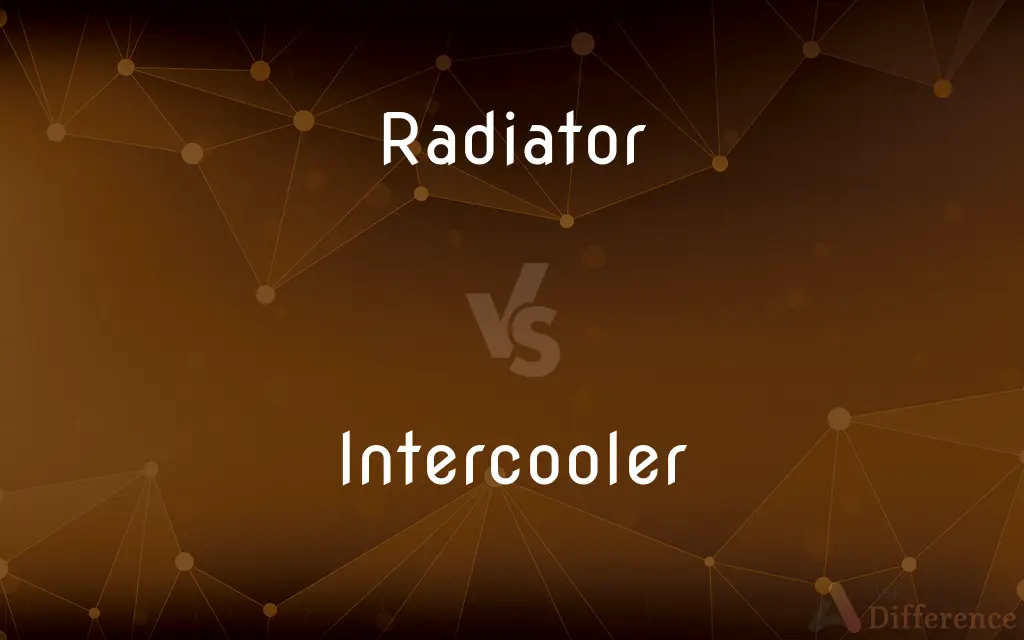Radiator vs. Intercooler — What's the Difference?
Edited by Tayyaba Rehman — By Fiza Rafique — Published on December 7, 2023
Radiators cool engine coolant; Intercoolers cool intake air. Both regulate temperature for efficiency.

Difference Between Radiator and Intercooler
Table of Contents
ADVERTISEMENT
Key Differences
Both the Radiator and the Intercooler serve the purpose of managing heat in vehicles, but they target different components. The Radiator cools down the engine's coolant, while the Intercooler cools the air before it enters the engine.
The Radiator, through a series of tubes and fins, dissipates heat from the coolant that circulates through the engine. On the other hand, the Intercooler, typically seen in turbocharged or supercharged engines, cools the compressed air from the turbocharger or supercharger before it enters the engine.
Typically, the Radiator is found at the front of most vehicles, allowing air to pass through as the vehicle moves. The Intercooler, depending on the design, can either be located near the front, like the Radiator, or closer to the engine, and comes in two main types: air-to-air and air-to-water.
The Radiator is crucial for preventing the engine from overheating and potentially causing severe damage. The Intercooler, while not essential in all vehicles, significantly boosts the efficiency of turbocharged/supercharged engines by providing cooler, denser air.
The Radiator often has a larger surface area and uses coolant, while the Intercooler may have a more compact design, especially the air-to-water type, and cools air directly or through water.
ADVERTISEMENT
Comparison Chart
Purpose
Cools engine coolant
Cools intake air
Commonly Found In
Almost all vehicles
Turbocharged/supercharged vehicles
Location in Vehicle
Front
Front or near engine
Cooling Medium
Coolant
Air or water
Design Appearance
Larger with many fins and tubes
Can be more compact; air-to-air or air-to-water
Compare with Definitions
Radiator
A device that dissipates heat from a liquid.
The car's Radiator needed replacement after a leak was discovered.
Intercooler
A heat exchanger used in forced induction engines.
Upgrading the Intercooler can improve engine efficiency.
Radiator
A panel that emits radiation.
The Radiator panel on the spacecraft helps control internal temperatures.
Intercooler
An apparatus to reduce intake air temperature.
The mechanic suggested installing a larger Intercooler for better airflow.
Radiator
An appliance to warm a room.
She turned up the Radiator to fend off the winter chill.
Intercooler
A device that cools air compressed by a turbocharger/supercharger.
The sports car's performance was enhanced with a top-of-the-line Intercooler.
Radiator
A transmitter of heat or energy.
The old computer acted as a Radiator, making the room uncomfortably warm.
Intercooler
A component ensuring denser air intake in engines.
With the new Intercooler, the engine achieved a better air-fuel mixture.
Radiator
A component in electronics to release excess heat.
The CPU had a dedicated Radiator to keep temperatures in check.
Intercooler
A cooling solution for engines with boosted air compression.
Racers often prioritize Intercooler upgrades for optimized performance.
Radiator
A heating device consisting of a series of pipes, typically inside an upright metal structure, through which steam or hot water circulates to heat the surrounding space by radiation or convection.
Intercooler
A device for cooling a fluid between successive heating stages.
Radiator
A similar heating device based on other technology such as the generation of heat through electrical resistance.
Intercooler
A heat-exchange device located between other devices or processes.
Radiator
A cooling device, as in automotive engines, through which water or other fluids circulate as a coolant.
Radiator
(Physics) A body that emits radiation.
Radiator
A transmitting antenna.
Radiator
Anything which radiates or emits rays.
Radiator
(automotive) A device that lowers engine coolant temperature by conducting heat to the air, through metal fins.
Radiator
(of buildings) A finned metal fixture that carries hot water or steam in order to heat a room.
Radiator
(electronics) A type of antenna.
Radiator
That which radiates or emits rays, whether of light or heat; especially, that part of a heating apparatus from which the heat is radiated or diffused; as, a steam radiator.
Radiator
Any of various devices for cooling an internal substance by radiation, as a system of rings on a gun barrel for cooling it, or a nest of tubes with large radiating surface for cooling circulating water, as in an automobile.
Radiator
An oscillator.
Radiator
Any object that radiates energy
Radiator
Heater consisting of a series of pipes for circulating steam or hot water to heat rooms or buildings
Radiator
A mechanism consisting of a metal honeycomb through which hot fluids circulate; heat is transferred from the fluid through the honeycomb to the airstream that is created either by the motion of the vehicle or by a fan
Common Curiosities
Can a vehicle function without a Radiator?
No, the Radiator is essential to prevent engine overheating and potential damage.
What is the primary function of a Radiator?
The Radiator cools the engine coolant, preventing the engine from overheating.
How do I know if my Radiator is failing?
Overheating, coolant leaks, or a sweet-smelling odor can indicate Radiator issues.
Do Radiators require maintenance?
Yes, regular coolant changes and flushes are needed to keep a Radiator in good condition.
How does an Intercooler benefit turbocharged engines?
An Intercooler cools the compressed intake air, providing denser air and boosting engine efficiency.
Is an Intercooler necessary for all cars?
No, Intercoolers are primarily used in turbocharged or supercharged engines.
Can you upgrade an Intercooler for better performance?
Yes, larger or more efficient Intercoolers can boost engine performance.
What coolant does a Radiator use?
Radiators typically use a mix of distilled water and antifreeze.
Is an Intercooler the same as a turbocharger?
No, a turbocharger compresses air, while an Intercooler cools this compressed air.
Where is the Radiator typically located in a vehicle?
The Radiator is usually at the front, allowing airflow as the vehicle moves.
What's the difference between an air-to-air and an air-to-water Intercooler?
An air-to-air Intercooler uses ambient air to cool, while an air-to-water uses a liquid coolant.
How does an Intercooler affect engine performance?
An Intercooler provides cooler, denser air, improving combustion and engine efficiency.
Do all turbocharged engines need an Intercooler?
While not strictly necessary, an Intercooler is recommended for better performance in turbocharged engines.
How do I identify Radiator leaks?
Puddles under the car, falling coolant levels, and overheating can indicate Radiator leaks.
Can a clogged Radiator lead to engine damage?
Yes, a clogged Radiator can cause overheating, potentially damaging the engine.
Share Your Discovery

Previous Comparison
Ectotherms vs. Endotherms
Next Comparison
Central Standard Time vs. Eastern Standard TimeAuthor Spotlight
Written by
Fiza RafiqueFiza Rafique is a skilled content writer at AskDifference.com, where she meticulously refines and enhances written pieces. Drawing from her vast editorial expertise, Fiza ensures clarity, accuracy, and precision in every article. Passionate about language, she continually seeks to elevate the quality of content for readers worldwide.
Edited by
Tayyaba RehmanTayyaba Rehman is a distinguished writer, currently serving as a primary contributor to askdifference.com. As a researcher in semantics and etymology, Tayyaba's passion for the complexity of languages and their distinctions has found a perfect home on the platform. Tayyaba delves into the intricacies of language, distinguishing between commonly confused words and phrases, thereby providing clarity for readers worldwide.












































